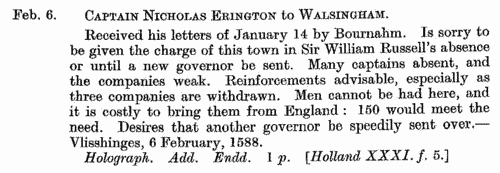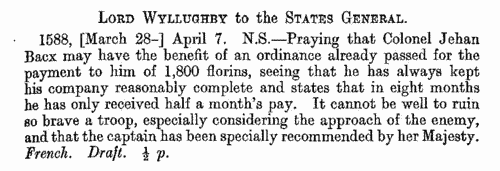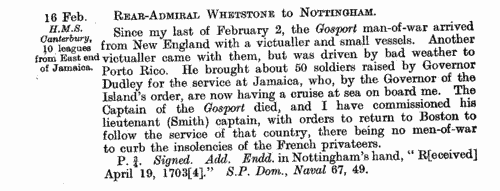Add this eBook to your basket to receive access to all 252 records. Our indexes include entries for the spelling wolff. In the period you have requested, we have the following 252 records (displaying 11 to 20): These sample scans are from the original record. You will get scans of the full pages or articles where the surname you searched for has been found. Your web browser may prevent the sample windows from opening; in this case please change your browser settings to allow pop-up windows from this site. Ambassadors, ministers, soldiers and spies
(1589)
The State Papers Foreign of queen Elizabeth consist mainly of letters and reports concerning England's relations with continental Europe, particularly the Netherlands and France. January to July 1589. | Sample scan, click to enlarge

| Traders in Canterbury
(1392-1592)
No man or woman could trade in the city of Canterbury without having obtained 'freedom' of the city, unless they paid an annual fee to do so. Admissions of freemen were recorded on the Chamberlains' Accounts of the city, which were prepared annually from Lady Day (25 March) to Lady Day until 1752, and thereafter each set runs from 1 January to 31 December. The accounts for 1392 are incomplete, but thereafter until 1800 there is a complete series except for the years 1455 to 1457 and the year 1552-3. Joseph Meadows Cowper, Honorary Librarian to the Corporation, transcribed and privately printed in 1904 the lists of the Intrantes - those persons, not being free of the city, who paid the annual fine to trade - for the period 1392 to 1592. The names are arranged by ward (Burgate, Newyngate, Westgate, Worgate and Northgate, and give full name, (sometimes) occupation, and fee paid. | Sample scan, click to enlarge

| Scottish litigants, rebels and cautioners
(1585-1592)
The Privy Council of Scotland exercised a superior judicial authority in the kingdom, and consequently received and dealt with a constant stream of petitions, as well as dealing with the internal security of the state. This register of the council from 1 August 1585 to 31 July 1592, in the reign of king James VI, was edited by David Masson, and published under the direction of the Lord Clerk Register of Scotland in 1881. Some of the individuals mentioned are the complainants, those of whom they complained, and the sureties on both sides: at this period, some of the complainants are alleging serious attacks, often of a feuding nature. Many of the bonds entered into by the cautioners are promises to keep the peace towards such enemies. Failure to answer to the council when summoned was a serious contempt, leading to being denounced a rebel, with serious consequences. But 'horning' was also used in the pursuit of debts: there was no imprisonment for debt in Scotland, but a creditor could have an obstinate debtor ordered, in the sovereign's name, to pay what was due, failing which, the debtor could be put to the horn, denounced as a rebel, and imprisoned as a rebel. The main text (to page 774) is from the Acta Secreti Concilii, containing the minutes of the Privy Council, with intermixed Acta Proper (political edicts), Decreta (judicial decisions), Acta Cautionis (acts of caution) and Bands (registration of bonds). After that are printed some miscellaneous Privy Council documents from the same years: additional acts of caution (775-778); ordinances and acts anent the Borders and the North (779-814); and miscellaneous privy council papers (815-834). The sources most productive of names, the Acta Cautionis and Registration of Bands, are also the most repetitive in form, and are not transcribed verbatim and literatim: nevertheless, one of the editor's rules was for 'All proper names and names of places occurring in the originals to be preserved in the abstracts without exception, and in the exact original spelling.'
| Sample scan, click to enlarge

| Scottish litigants, rebels and cautioners
(1592-1599)
The Privy Council of Scotland exercised a superior judicial authority in the kingdom, and consequently received and dealt with a constant stream of petitions, as well as dealing with the internal security of the state. This register of the council from August 1592 to May 1599, in the reign of king James VI, was edited by David Masson and published under the direction of the Deputy Clerk Register of Scotland in 1882. The publication brings together the contents of the principal register (Acta Secreti Concilii) with acts and bands (bonds) of caution (surety) from the registers called Acta Cautionis (pp 561-730); Acts and Ordinances relating to the Borders and the North (731-748); and Miscellaneous Privy Council Papers (749-769). Many of the individuals mentioned are the complainants, those of whom they complained, and the sureties on both sides: at this period, many of the complainants are alleging serious attacks, often of a feuding nature. Many of the bonds entered into by the cautioners are promises to keep the peace towards such enemies. Failure to answer to the council when summoned was a serious contempt, leading to being denounced a rebel, with serious consequences.
| Sample scan, click to enlarge

| Lord Willoughby in the Netherlands
(1580-1601)
Mrs S. C. Lomas of the Historical Manuscripts Commission prepared this calendar of the manuscripts of the Earl of Ancaster preserved at Grimsthorpe, published in 1907. The records covered are from 1550 to 1737, but the bulk of this volume is given over to an edition of the correspondence of Peregrine lord Willoughby, who was appointed governor of Bergen-op-Zoom in 1586, and spent the next ten years commanding English and Dutch forces against those of Spain. There are also a few pages (449 to 452) dealing with a scattering of ancient deeds (from c.1160 to 1547); some items from inventories (452-459, c.1522 to after 1742) and household accounts (459-482, 1560-1661) which attracted Mrs Lomas's attention; and notes from a muster roll of Baberg hundred, Suffolk, of about 1522, from which some names are given in the text. | Sample scan, click to enlarge

| Inhabitants of Cambridge
(1504-1635)
Cambridge comprised fourteen ancient parishes, plus the university (which was extra-parochial), in the diocese of Ely. The church of St Mary the Great (as opposed to St Mary the Less) in the Market Place (juxta forum) has churchwardens' accounts surviving from 1504 onwards. Those from 1504 to 1635 were transcribed by J. E. Foster for the Cambridge Antiquarian Society and published in 1905. The two churchwardens were chosen annually: the previous year's churchwardens each chose another parishioner: those two then each chose three other parishioners: the resulting eight then chose the new year's churchwardens, the wardens of the Light of the Rood, and the wardens of the Mass of Jesus. Auditors were also chosen, usually out of the eight, to examine all the wardens' accounts at the end of the year. The churchwardens' accounts are largely concerned with the costs of repair of the church and its furnishings, and include the names of tradesmen and workmen. Each Easter a rate called Easter money was raised was raised from all householders in the parish, and additional rates are occasionally levied for unusual expenses, such as steeple reconstruction. These 'Easter book' lists give a complete list of householders for the parish, excepting the poor. The church's income also included the rents from some houses in the parish, and the names of the tenants appear. The offices of the Light of the Rood and the Mass of Jesus were abolished during the Reformation. The accounts of the Light of the Rood, i. e., for candles burnt before the crucifix, often include a list of sums received for funerary diriges (dirges) for the year, from which the year of death of the more prosperous parishioners can be traced in this early period. | Sample scan, click to enlarge

| Official Papers
(1690-1691)
The State Papers Domestic cover all manner of business relating to Britain, Ireland and the colonies, conducted in the office of the Secretary of State as well as other miscellaneous records. Includes lists of passes to travel abroad.
| Sample scan, click to enlarge

| Official Papers
(1694-1695)
The State Papers Domestic cover all manner of business relating to Britain, Ireland and the colonies, conducted in the office of the Secretary of State as well as other miscellaneous records. Here we have the period from January 1694 to June 1695.
| Sample scan, click to enlarge

| Inhabitants of Salisbury
(1443-1704)
A collection of transcripts of churchwardens' accounts from the parishes of St Edmund and St Thomas in Sarum (Salisbury in Wiltshire) by Henry James Fowle Swayne, the Recorder of Wilton, was published by the Wilts Record Society in 1896. The greater part of these accounts relate to expenditure to workmen on the church fabric, and income for rent of pews and the tolling of bells and obsequies for parishioners. There are several sources covered: the churchwardens' accounts for St Edmund's for 1443 to 1461; for St Thomas's 1545 to 1690, and some notes from 1704; and accounts of the stewards of the Fraternity of Jesus Mass founded in St Edmund's. | Sample scan, click to enlarge

| Official Papers
(1703-1704)
The State Papers Domestic cover all manner of business relating to Britain, Ireland and the colonies, conducted in the office of the Secretary of State as well as other miscellaneous records. Includes lists of passes to travel abroad. June 1703 to April 1704.
| Sample scan, click to enlarge

|
Research your ancestry, family history, genealogy and one-name study by direct access to original records and archives indexed by surname.
|











